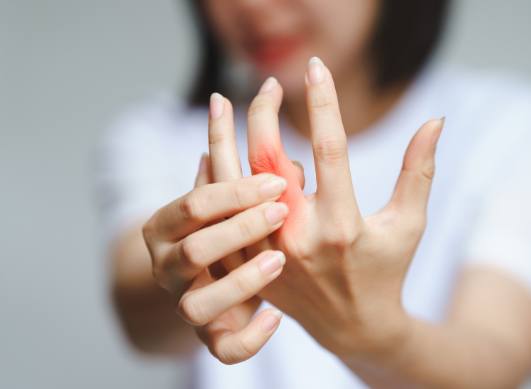- Home
- Share
- Forum
- Rheumatoid arthritis Forum
- Living with rheumatoid arthritis
- Does your rheumatoid arthritis affect your sleep? Share your tips!
Patients Rheumatoid arthritis
Does your rheumatoid arthritis affect your sleep? Share your tips!
- 549 views
- 15 times supported
- 26 comments
All comments
Go to the last comment

Courtney_J
Community managerGood advisor
![]()
Courtney_J
Community manager
Last activity on 13/10/2022 at 16:47
Joined in 2020
1,280 comments posted | 24 in the Rheumatoid arthritis Forum
10 of their responses were helpful to members
Rewards
-
Good Advisor
-
Contributor
-
Messenger
-
Committed
-
Explorer
-
Evaluator
Hello everyone,
Have you seen this older discussion? ![]()
Does your RA affect your sleep? If so, what do you do to sleep better? Do you have any tips to share?
@Aideen61 @Susiemaxwell @earthspirit @Mog789 @Dolphin5005 @Henrietta1 @RoMatt @Cherie1958 @holdaway @Lala68 @Porky55 @AndreaF @shenia34 @Romeos @rachtait88 @Rhonda123 @QueenB @Colin1234 @Krissy1
Feel free to share here!
Take care,
Courtney
See the signature
Courtney_J, Community Manager, Carenity UK
![]()
mikki59
![]()
mikki59
Last activity on 07/07/2024 at 15:21
Joined in 2017
1 comment posted | 1 in the Rheumatoid arthritis Forum
Rewards
-
Explorer
Thank you
![]()
Jonboi67
![]()
Jonboi67
Last activity on 03/12/2024 at 22:13
Joined in 2018
2 comments posted | 2 in the Rheumatoid arthritis Forum
Rewards
-
Explorer
Yes i wake in the nite as my right leg aches im now going for more xrays on my pelvis and mri scan aswell
![]()
Jonboi67
![]()
Jonboi67
Last activity on 03/12/2024 at 22:13
Joined in 2018
2 comments posted | 2 in the Rheumatoid arthritis Forum
Rewards
-
Explorer
Ohhh i have osteo arthritis
![]()
Raythebaker
AmbassadorGood advisor
![]()
Raythebaker
Ambassador
Last activity on 02/12/2024 at 17:07
Joined in 2018
13 comments posted | 9 in the Rheumatoid arthritis Forum
2 of their responses were helpful to members
Rewards
-
Good Advisor
-
Contributor
-
Messenger
-
Explorer
I have trouble getting to sleep & I have tried everything amytripolene & other things so I just live with it
Give your opinion
Members are also commenting on...
Living with rheumatoid arthritis
Rheumatoid arthritis diagnosis: What kind of tests did you undergo?
![]()
![]()
![]()
Articles to discover...

23/08/2023 | Testimonial
Dietitian Tanya helps the Lupus community to reduce their symptoms with diet and healthy living.
Medication fact sheets - patient opinions...
Subscribe
You wish to be notified of new comments
Your subscription has been taken into account







JosephineO
Community managerGood advisor
JosephineO
Community manager
Last activity on 15/07/2024 at 09:21
Joined in 2018
989 comments posted | 39 in the Rheumatoid arthritis Forum
6 of their responses were helpful to members
Rewards
Good Advisor
Contributor
Committed
Explorer
Evaluator
Friend
People with rheumatoid arthritis may find that pain or discomfort prevents them from falling asleep. Not sleeping well can have an impact on the severity of a person's symptoms, as well as their general well-being. But there are some things that people can try that may help with sleep.
Pain, discomfort, and the side effects of medication can make it harder for a person with RA to fall asleep or stay asleep throughout the night.
According to the Centers for Disease Control and Prevention (CDC), adults over 18 should get a minimum of 7 hours of sleep per night. Getting less than this on a regular basis can have an impact on a person's health. Lack of sleep can make RA symptoms worse, and could lead to a flare-up of the disease. Fatigue can make the pain more difficult to manage.
RA and insomnia
RA can cause pain, which may cause stress or worry and prevent a person from getting to sleep. Some people may find that their symptoms cause them to wake during the night.
Some medications, such as prednisone and hydroxychloroquine, also have the side effect of causing sleeplessness. It is a good idea to take these drugs earlier in the day to reduce this effect.
Tips for dealing with insomnia
1. Exercising
Exercise can help a person sleep.
Gentle exercise is a meaningful way to reduce or improve RA symptoms. Exercise can also help a person to sleep and can improve mood and well-being.
The CDC recommend that a person does 2.5 hours of moderate exercise every week. However, people with RA should start slowly and build up the amount of activity they do according to their ability. It is better to do a small amount of exercise than nothing at all.
Walking, swimming, cycling, and stretching are all examples of exercise that will not put too much strain on the joints or the body.
Exercise can also help to keep joints flexible, which should improve the range of motion a person has in their joints. People should avoid activities that put too much pressure on the joints, for example twisting or jumping.
RA can also cause disability in the long-term and exercise can help to prevent or delay this.
2. Cutting out caffeine
Caffeine can stop people from falling asleep.
People with RA should avoid drinking caffeine late in the afternoon or evening if it is affecting their sleep.
It is possible to replace coffee or tea with decaffeinated versions or herbal teas. Watch out for hidden sources of caffeine, such as soda, energy drinks, and green tea.
3. Avoiding alcohol
Drinking alcohol in the evening can stop a person from falling asleep easily. It may also mean a person wakes during the night or does not sleep as deeply.
Drinking alcohol alongside some RA medications could also pose a health risk.
4. Trying not to nap
Some RA medication can cause drowsiness, and napping or falling asleep during the day can make it more difficult to sleep at night.
People should try to avoid taking a nap during the day for this reason. Getting some fresh air or doing stretching exercises can help a person feel less drowsy and avoid napping.
5. Relaxing
Living with RA can be stressful, and taking time to relax, particularly before trying to fall asleep, can help.
Try creating a bedtime routine that is the same every night. People may choose to read a book, light a candle, or play some quiet music.
Sometimes, when a person is trying to get to sleep, worries or concerns often intrude into their minds. Keeping a notepad or dictaphone by the bed to record these concerns can help keep them out of mind.
6. Practicing good sleep hygiene
Using good sleep hygiene practices can help a person get to sleep faster.
Sleep hygiene means adopting good habits for better sleep, including:
going to bed and getting up at the same time every day
making the bedroom a quiet, relaxing space
keeping the temperature cool in the bedroom
using a blackout blind to make sure the bedroom is dark enough to sleep
switching off electronic devices 30 minutes before getting into bed
Good sleep hygiene can help the body recognize when it is time for sleep. If a person is relaxed and has no distractions, they should be able to get to sleep faster.
7. Meditating
Research on mindfulness meditation suggests that it can help to treat insomnia.
Taking time to do a meditation exercise, such as focusing on breathing, can help to calm the mind and relax the body.
Meditating can make it easier to fall asleep, or help a person go back to sleep if they wake in the night.
8. Not overeating before bed
Going to sleep with a stomach that is too full can stop a person getting to sleep.
Try to eat at least a couple of hours before going to bed. Any snacks before trying to fall asleep should be light.
Do you have any tips to share about how you get to sleep?